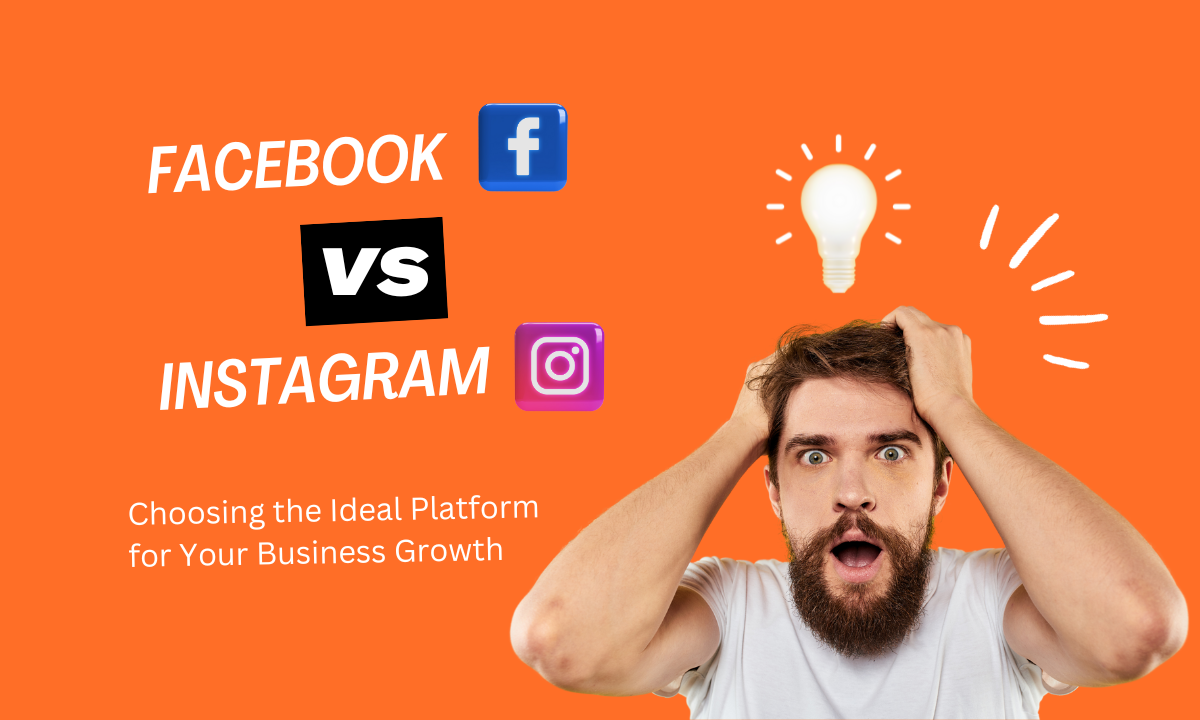Social media marketing is more competitive than ever. And if you’re trying to decide between Facebook and Instagram, you’re not alone.
Both platforms have billions of active users and powerful marketing features. But which one is right for your brand in 2025?
In this guide, we’ll compare Facebook and Instagram in terms of audience, engagement, content, advertising, and more to help you make the best decision.
Facebook vs. Instagram: A Quick Overview
-
Monthly Active Users: 3.07 billion (2024)
-
Best For: Community building, long-form content, targeted advertising
-
Key Features: Groups, Events, Marketplace, Messenger, Ads Manager
-
Primary Content Types: Text, images, videos, links, live streams
-
Monthly Active Users: 2.35 billion (2024)
-
Best For: Visual storytelling, brand awareness, influencer marketing
-
Key Features: Reels, Stories, IGTV, Shopping, Influencer collaborations
-
Primary Content Types: Images, videos, Stories, Reels, carousels
1. Audience Comparison
Who Uses Facebook?
-
Older demographics dominate: The majority of users are 25-54 years old.
-
More diverse audience: Facebook is widely used across all age groups and global markets.
-
B2B-friendly: Many decision-makers and professionals actively use Facebook for networking.
Who Uses Instagram?
-
Younger audience: Most Instagram users are 18-34 years old.
-
More engagement from Gen Z & Millennials.
-
Visual-heavy niches dominate: Fashion, beauty, travel, fitness, food, and influencers thrive here.
2. Engagement & User Behavior
Facebook Engagement
-
Lower organic reach: Facebook’s algorithm prioritizes ads and personal interactions.
-
More time spent per session: Users spend 33 minutes/day on average.
-
Groups and Communities thrive: Facebook Groups drive high engagement for niche topics.
Instagram Engagement
-
Higher organic reach: Instagram Reels, Stories, and posts still have strong organic visibility.
-
Shorter attention span: Users scroll quickly, spending 29 minutes/day on average.
-
More interactions with brands: Instagram has 10x higher engagement than Facebook.
3. Content Strategy: What Works Best?
Best Content for Facebook
-
Long-form posts: Facebook allows longer captions, articles, and discussions.
-
Video content: Facebook prioritizes video posts (especially live videos) in its algorithm.
-
Links to external content: You can drive traffic to your website or blog more easily.
Best Content for Instagram
-
Short, visual content dominates: Eye-catching images, short videos, and Reels perform best.
-
Stories & Reels boost engagement: Short-form videos are favored by Instagram’s algorithm.
-
No clickable links in posts: You’ll need Link in Bio or Stories to drive traffic.
4. Advertising: Which Platform Offers Better ROI?
Both Facebook and Instagram are owned by Meta, meaning they share Meta Ads Manager for running campaigns. But each platform has different strengths.
Facebook Ads
-
More advanced targeting: Use demographics, behaviors, interests, retargeting, and Lookalike Audiences.
-
Lower cost per click (CPC): Facebook ads often have a lower CPC compared to Instagram.
-
Better for B2B & lead generation: Ads can be optimized for lead forms, website clicks, and conversions.
Instagram Ads
-
Higher engagement rates: Instagram users interact with ads more frequently.
-
Best for brand awareness: Ads blend seamlessly with organic content.
-
Ideal for visual products: Fashion, beauty, travel, and lifestyle brands see great results.
5. Shopping & E-Commerce Features
Facebook Shopping
-
Facebook Marketplace: Allows businesses and individuals to sell products.
-
Facebook Shops: Fully integrated e-commerce stores for brands.
-
Messenger integration: Customers can chat before purchasing.
Instagram Shopping
-
Shoppable posts: Tag products directly in your feed.
-
Instagram Checkout: Users can buy without leaving Instagram.
-
Influencer-powered sales: Many brands leverage influencers to drive purchases.
6. Which Platform is Best for Your Business?
Choose Facebook If:
-
You target an older, more diverse audience.
-
You focus on community building and discussions.
-
You need low-cost, highly targeted advertising.
-
You run a B2B or service-based business.
Choose Instagram If:
-
Your audience is younger (18-34 years old).
-
You rely on high-quality visual content.
-
You want to leverage influencer marketing.
-
You sell products that benefit from visual storytelling.
The Bottom Line
Facebook and Instagram both offer powerful marketing opportunities, but the best choice depends on your business goals, target audience, and content strategy.
For maximum results in 2025, many brands use both platforms strategically: Facebook for community-building and long-form content, and Instagram for high-engagement visuals and influencer marketing.
Which platform do you prefer for your brand? Let us know in the comments!





[…] Facebook vs. Instagram in 2025: Which Is Best for Your Brand? […]
[…] Facebook vs. Instagram in 2025: Which Is Best for Your Brand? […]